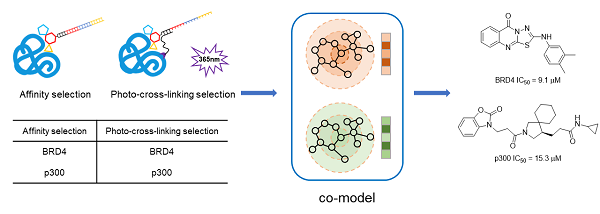AI Meets DEL Technology to Accelerate Drug Discovery
DNA-encoded library (DEL) technology is valued for its high throughput, ease of operation, minimal sample requirements, low screening costs, and rapid processes. It has been effectively applied in discovering new inhibitors targeting various therapeutic proteins. This makes it a practical choice for initial discovery of active substances in pharmaceutical industry.
However, the technology has certain limitations and areas requiring improvement. Key challenges include expanding its applications beyond "affinity screening" to incorporate functional screening and addressing issues such as false positive signals during data analysis. Moreover, constructing high-quality compound libraries remains a critical task. The emergence of artificial intelligence (AI) has created significant opportunities across multiple disciplines. In drug discovery, AI demonstrates unique advantages, enhancing the potential of DEL technology.
In a study published in Journal of Medicinal Chemistry on October 25, 2024, the research groups led by Prof. LU Xiaojie and Prof. ZHENG Mingyue from the Shanghai Institute of Materia Medica (SIMM) of Chinese Academy of Sciences, proposes an innovative approach. By integrating affinity screening with photo-crosslinking screening, the researchers enhanced the chemical space diversity of DEL compound libraries. Additionally, they synergized DEL technology with AI to accelerate drug discovery.
The study utilized DEL screening data for three proteins—BRD4, p300, and WDR5. Researchers explored various aspects, including complementary chemical space of datasets, selection of training models, and development of combined and synergistic models. Using DEL data with complementary chemical spaces, they constructed small-molecule predictive models targeting specific proteins. This approach successfully identified lead compounds for BRD4 and p300, showing promising potential for drug development. These findings offered a new pathway for drug discovery targeting underexplored proteins.
Rather than aiming for predictive models to directly identify nanomolar-level active molecules, this strategy provided a novel perspective for medicinal chemistry optimization, which is particularly valuable when active compounds identified through DEL screening face challenges in further optimization. The approach offers opportunities to refine and develop potential drug candidates. With rapid advances in AI, DEL technology can supply high-throughput, consistent data, especially for underexplored protein targets. The integration of DEL and AI opens new and compelling research directions in drug discovery, driving innovation and providing tools to tackle complex therapeutic challenges.
DOI: 10.1021/acs.jmedchem.4c01416;
Link: https://doi.org/10.1021/acs.jmedchem.4c01416.

This study refined traditional DEL by AI techniques such as photo-cross-link screening to improve chemical diversity. Combining these methods improved the predictive performance of small molecule identification models. (Image by SUO Yanrui)
Contact:
JIANG Qingling
Shanghai Institute of Materia Medica, Chinese Academy of Sciences
E-mail: qljiang@stimes.cn




